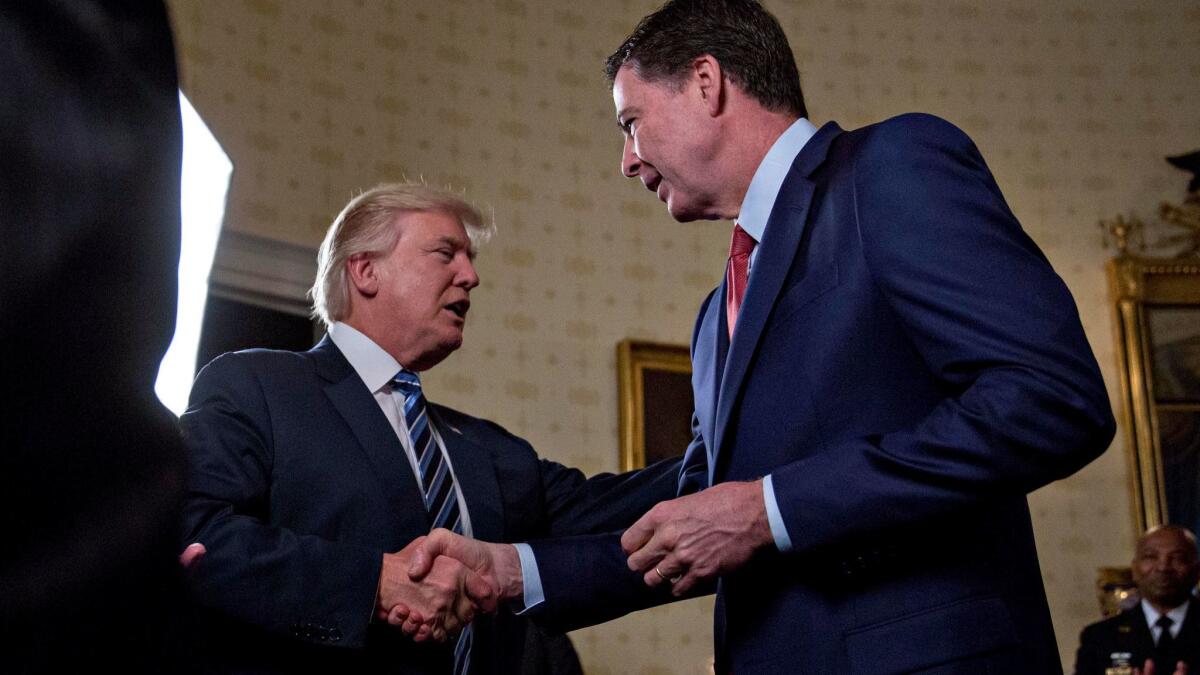Q&A: Comey’s testimony: What could hurt Trump and what might help him

- Share via
Former FBI Director
Comey really did tell Trump he wasn’t personally under investigation
When he fired Comey, Trump noted that the FBI chief had assured him three times that he was not under investigation. Comey confirmed that in his statement.
Republicans quickly seized on that as a major talking point.
Does that mean Trump is now in the clear?
No, on several grounds. To begin with, until Trump made his remark, the idea that the president might personally be under scrutiny was never at the center of the controversy. The main focus had always been possible coordination between Russian agents trying to influence the 2016 election and people close to Trump, not the president himself.
Moreover, Trump’s actions — especially his request, according to Comey, that the FBI drop the investigation of former national security advisor
And, of course, the investigation is continuing. We don’t know what else special counsel
The first problem area for Trump — interceding for Flynn
Comey’s statement confirms widespread media reports that on Feb. 14, the president asked the then-FBI director to drop an investigation into retired Gen. Michael Flynn, the man Trump had just fired as national security advisor.
I had understood the president to be requesting that we drop any investigation of Flynn in connection with false statements.
— James Comey statement
Comey did not share that request with anyone involved in the investigation, and there’s no indication that it actually impeded the probe. But just the attempt to get a case dropped at minimum violated long-standing government policies.
Whether Trump’s words also broke any laws is open to debate. Federal law makes it a crime to “corruptly” seek to “obstruct or impede” the “due and proper administration of the law.”
One question would be whether Trump’s intent in asking Comey to drop that part of the FBI investigation was “corrupt.” The fact that Trump ordered everyone else out of the Oval Office — including Atty. Gen. Jeff Sessions — before making the request of Comey could be evidence on that question, legal experts have said.
The second problem — the demand for ‘loyalty’
According to Comey, at a private dinner with Trump on Jan. 27, the president asked him if we wanted to stay on as FBI director and then declared that “I need loyalty, I expect loyalty.”
That statement could bolster the case that the president’s decision to fire Comey was based on an improper motive — a desire for an FBI chief who would put loyalty to Trump ahead of the demands of the law.
The jeopardy on that point may be more political than legal. Polls show that while many Americans already have made up their minds on what they think of the firing, an important segment are still deciding, and Comey’s personal account could be important to them.
The third problem — Trump seems unconcerned about his staff
Although Trump repeatedly asked Comey to say that he was not personally under investigation and insisted that the FBI should make that public, he seemed much less interested in the fate of others caught up in the probe.
According to Comey, he was told by Trump that “if there were some ‘satellite’ associates of his who did something wrong, it would be good to find that out, but that he hadn’t done anything wrong.”
That comment may not sit well with those associates, some of whom are now confronted with grand jury subpoenas and need to weigh how much they’re willing to say to prosecutors.
Trump demanded 'loyalty,' asked for end to Flynn investigation, Comey to testify »
Get the L.A. Times Politics newsletter
Deeply reported insights into legislation, politics and policy from Sacramento, Washington and beyond. In your inbox three times per week.
You may occasionally receive promotional content from the Los Angeles Times.








